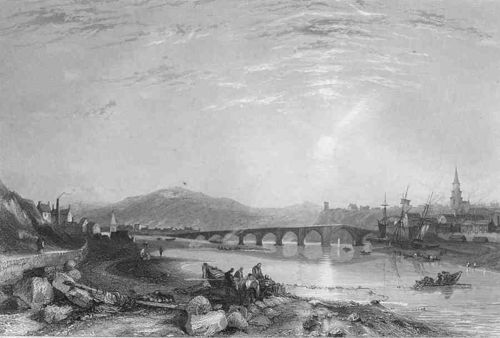Annotation:Go to Berwick Johnny
Back to Go to Berwick Johnny
GO TO BERWICK, JOHNNY. AKA and see "Barwick Billy." AKA - "Berwick Johnny," "Berwick Jockey (2)." Scottish, English; Old or Triple Hornpipe (3/2 time). England, Northumberland. F Major (Gow, Williamson): G Major (Oswald, Bruce & Stokoe): D Major (Gatherer, Kennedy, O'Farrell). Standard tuning (fiddle). AB (Gatherer): AAB (Gow/2nd Repository): AABB (Plain Brown Wrapper, Bruce & Stokoe): AABBCC (Gow/Carlin, O'Farrell, Williamson): AABBCCDD (Gow/4th Repository): AABBCCDDEE (Kennedy). A triple-time hornpipe of a style which originated in the Border regions of England and Scotland, but also associated with the English counties of Lancaster, Nottingham, and Derby. The Old English name Berwick has to do with a dwelling place or outlying farm involved with barley cultivation. The town of Berwick itself is in the Border region of northern England in Northumberland. Williamson (1976) thinks the tune may date from the union of the (Scottish and English) crowns in 1707, when a wanted man could cross the border to safety over the Tweed River at Berwick, however, an early version called "New Road to Berwick" predates that, and appears in the Henry Atkinson (Morpeth, Northumberland) manuscript book, dated 1694. Another early version (albeit unfinished) is in a MS called Margaret Sinkler's Musick Book of 1710 (a manuscript copy of the music book of Andrew Adam, Glasgow) where it appears as "Berwick Johnny." It appears in a variety of other British musicians' manuscripts, including William Dixon's 1733 manuscript (under the title "Berwick Bully"), John Fife (Perthshire and at sea, 1780), William Clarke (Feltwell, Northumberland, 1858), William Vickers (Northumberland, 1770), Tom Clough (Northumberland), Elisabeth Williamson (unknown, 1790), John Miller (Perth, Scotland, 1799) and Bewick (Northumberland). The title, also as "Berwick, Johnny," appears in Henry Robson's list of popular Northumbrian song and dance tunes, which he wrote c. 1800. There presently survive lyrics to the melody.

See also County Cork cleric and uilleann piper Canon James Goodman's "Miss Perkins Jig," which Hugh and Lisa Shields believe is a related tune in 9/8 time (parts reversed).
Source for notated version: the c. 1847 music manuscript of Ellis Knowles (Radcliffe, Lancashire) [Plain Brown Wrapper].
Printed sources:
Bruce & Stokoe (Northumbrian Minstrelsy), 1882; p. 162.
Callaghan (Hardcore English), 2007; p. 76.
Carlin (The Gow Collection), 1986; No. 504.
Doyle (Plain Brown Tune Book), 1997; p. 4.
Gatherer (Gatherer's Musical Museum), 1987; p. 25.
Gow (Complete Repository, Part 2), 1802; p. 30.
Gow (Complete Repository, Part 4), 1817; pp. 22–23.
Johnson, Scots Musical Museum (1793–1841).
Kennedy (Fiddler's Tune-Book: Slip Jigs and Waltzes), 1999; No. 24, p. 7 (appears as "Go to Berwick, Jockey").
O'Farrell (Pocket Companion, vol. II), c. 1806; p. 140.
Oswald (Caledonian Pocket Companion, Book 6), 1760; pp. 22–23.
Preston (Preston's Twenty Four Country Dances for the Year 1798), 1798.
Williamson (English, Welsh, Scottish and Irish Fiddle Tunes), 1976; p. 58.
Wilson (Companion to the Ball Room), 1816.
Recorded sources: EFDSSCD13, Rising Sun Band - "Hardcore English" (2007. Various artists). Folksound FSCD37, Rising Sun Band - "Setting it Right."
See also listing at:
Jane Keefer's Folk Music Index: An Index to Recorded Sources [1]
